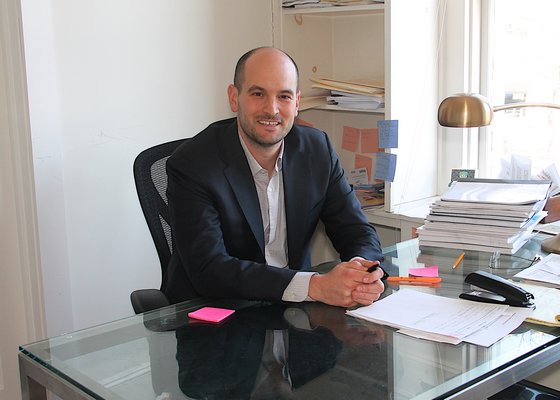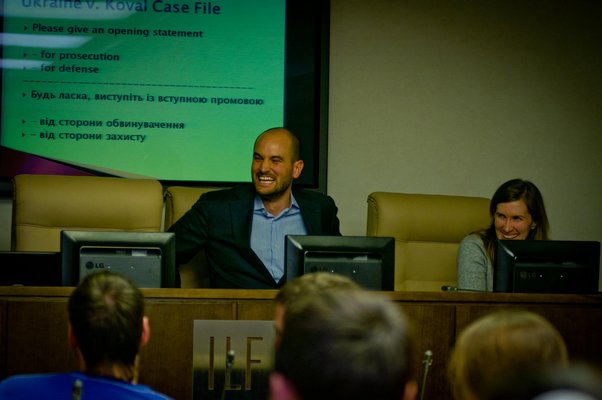For OLA Attorney, The Hague Was A Training Ground
- OLA of Eastern Long Island

- Apr 1, 2019
- 4 min read
Updated: May 1, 2022
By Michael Wright
A typical aspiring attorney would spend the summers between the years at law school toiling as an intern in the office of the sort of law firm he or she someday hopes to work for.For East Hampton attorney Andrew Strong, the summer after his first year of law school at Northwestern University would be quite a break from the typical—and would not soon land him back in a classroom.
The Chicago native, who now is the in-house attorney for the Latino-advocacy group OLA of Eastern Long Island and a Democratic candidate for East Hampton Town justice, had a job as a research assistant for one of his professors, who was working on a book about the Kosovo Liberation Army, which had battled Serbian control of Kosovo in 1998 and 1999. Mr. Strong agreed to travel to Kosovo to interview one of the KLA’s former leaders, the newly elected prime minister of Kosovo, Ramush Haradinaj.
Mr. Haradinaj and the little army had mounted a bloody resistance—with the help of U.S. warplanes and bombs—to the mighty and notoriously vicious Serbian army. Several of the leaders of the Serbian attempts to repress the ethnic Albanian majority in Kosovo were being or had been tried for war crimes by the United Nations International Criminal Tribunal for the former Yugoslavia.
When Mr. Strong arrived in Pristina in mid-2004, the court had just handed down its first indictment against a KLA leader—Mr. Haradinaj.
“Everybody agreed that he had fought a just war—the Serbina paramilitaries had burned down his village and tried to kill his family,” Mr. Strong recalled of Mr. Haradinaj. “The ICTY said, ‘Yes, this was a just war, but we still have to look at the methods the KLA used.’ There were some serious ramifications for the U.S., because this was the heart of the war on terror in 2004, and the indiscriminate killing of civilians was a sensitive thing.”
In his research for the book, Mr. Strong met an Irish consultant, Michael O’Reilly, who was working with Mr. Haradinaj’s defense team. Caught up in the drama of the coming trial, Mr. Strong begged his way into a summer internship with Mr. O’Reilly, who had been assigned to the Haradinaj case by the U.S.-based National Democratic Institute, for which the Irish commercial attorney was doing pro bono work.
That internship would turn into a seven-year role on the legal teams that successfully defended Mr. Haradinaj through two trials at The Hague.
“I was in the right place at the right time, and there weren’t that many people who were willing to move to Pristina for what was going to be years,” Mr. Strong said of his landing a role in the case. “I stayed for the summer, and then I said to myself, well, this is more interesting than anything I’m going to do in Chicago. So I moved to Kosovo, I learned Albanian and I started building this picture of the war in western Kosovo, which had seen the heaviest fighting.
“Ramush, he never told me anything about whether he was innocent or not—he just said, ‘Go talk to the people.’ I was really compelled by his character.”
For months, Mr. Strong traveled the Kosovar countryside, collecting the tales of the war from people who had witnessed its violence firsthand. In the first trials at The Hague since Nuremberg, how the military had conducted itself was a key element.
The young American was met with a fair amount of suspicion, often from those who thought an American asking questions must be working for the CIA, with ulterior motives. Guns—which are almost universally owned in Kosovo—were sometimes pulled; retreats occasionally were hasty. But, for the most part, he found people who saw Mr. Haradinaj as a hero.
And the courts listened.
“The judges came back and went so far as to say that not only had he not committed any crimes against civilians, he had gone out of his way to protect civilians, even when it posed additional risk to himself and his soldiers,” Mr. Strong recalled. “It was quite an extraordinary thing that they did that.”
Nonetheless, the rules of The Hague, in which there is no limitation on double jeopardy, allowed the prosecutors to appeal the ruling and bring their case again before a new three-judge panel. In the second case, the prosecution could be more selective about witnesses and evidence that they thought better supported their case.
But after a year of testimony, the judges still found Mr. Haradinaj free of blame. He was elected Kosovo’s prime minister for a second time in 2017.
Between the two trials, which ran from 2005 to 2008 and from 2011 to 2012, Mr. Strong returned to Northwestern University and finished his law degree, worked on a juvenile criminal defense unit—Illinois was, at the time, one of the states that allowed juveniles to be sentenced to life in prison—and for the UN Special Rapporteur on Counterterrorism and Human Rights.
Somewhere along the line, he met and married a Sag Harbor native, Rachael Faraone, had three children, and found a calling in human rights law and a home in Springs.
He looks back on his years spent in overseas courtrooms as a special training ground for the law he will apply here. Are his days in international law over with?
Yes and no, he says.
“There’s another tribunal being set up around the Balkan Conflict, focusing on Kosovo and the war crimes committed in 1999, at the end of the war,” he said. “I’ve been contacted by a couple of defense teams. So I’m thinking about doing some work on that—from East Hampton.”








Comments